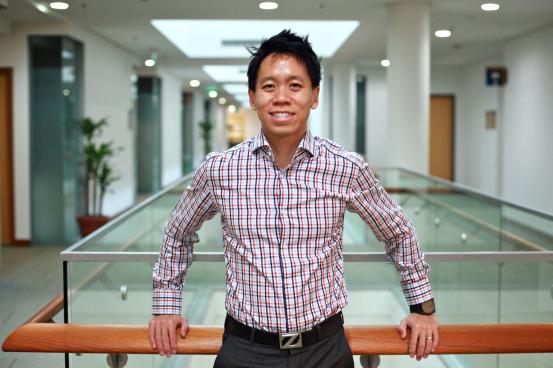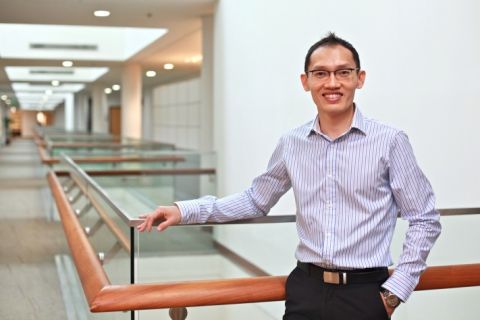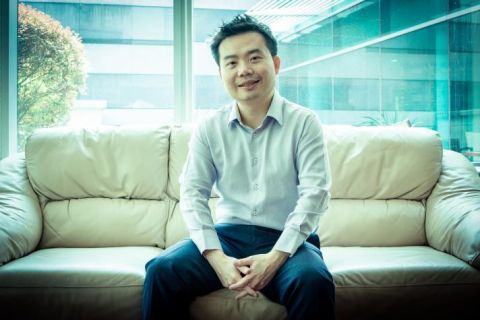
From epic tales spun around investment legends Ray Dalio and George Soros, to the secretive, high-octane world of Wall Street, the hedge fund has attained a worldwide notoriety for being an opaque, unwieldy beast. Professor Melvyn Teo from the SMU Lee Kong Chian School of Business studies what makes them tick.

Photo Credit: Daniel Tham
SMU Office of Research (15 Mar 2014) – The secretive world of hedge funds has gained a notorious reputation in popular culture. From Martin Scorsese’s Oscar-nominated film The Wolf of Wall Street, to Bernie Madoff’s scandalous ponzi scheme, an aura of mystery seems to surround these financial entities.
It is precisely the enigmatic nature of this space that makes it interesting to Melvyn Teo, Professor of Finance and Associate Dean (Research) at the Singapore Management University (SMU) Lee Kong Chian School of Business. “The attraction for me was that very little is known about hedge funds; they are not immediately very transparent and a lot of misconceptions exist about these financial market players. I wanted to understand them better,” he says.
Geography and hedge fund performance
Professor Teo is best known for his work on the geography of hedge funds. By analysing the different performances by funds invested in Asia from Asia, versus funds invested in Asia from locations further afield like the United States (US) and United Kingdom (UK), he found that hedge funds with a physical presence (head or research office) in their investment region outperformed other hedge funds by 3.72% per year. While the local information advantage was pervasive across all major geographical regions, it was strongest for emerging market funds and funds holding illiquid (that is, not easily converted into cash) securities.
“We tried to push the envelope by asking: if physical distance matters, then cultural distance must also matter,” Professor Teo says. He tested whether native Japanese speakers had an advantage over non-native speakers. “Japan is a good place to test because it is a notoriously closed society. It is tough for non-Japanese to understand cultural nuances, various phrases and other things. We found that native speakers outperformed non-native speakers by roughly 5% per year,” he says.
Not content with these findings, Professor Teo then asked why, when proximity matters so much, do more hedge fund managers not set up shop in Asia to invest in Asia. “We wanted to know what hedge funds care about and found that they care about performance, raising capital and raising funds on favourable terms.”
His research showed that distant funds, especially those based in the US and UK, are able to raise more capital, charge higher fees and set longer redemption periods, despite their underperformance relative to nearby funds. Distant funds trade investment performance for better access to capital, he found.
The liquidity risk of hedge funds
A big concern is that the hedge fund industry suffers from an asset-liability mismatch, that is, a disparity between the liquidity that hedge funds say they can provide and the liquidity of their underlying assets. “It is a game they play, where they take on lots of risk to attract more investors, in turn, to attract higher returns,” he says.
During the 2008 financial crisis, limits placed on the withdrawal of fund capital by investors, or suspended redemption, caught many by surprise. Professor Teo decided to study hedge funds that offer favourable redemption terms (that is, monthly redemptions or better), looking for instances when hedge funds take on excessive liquidity risk.
“We investigated this phenomenon and asked which hedge funds play this game more often, and when this is more dangerous for the fund manager. We sorted the universe of hedge funds by liquidity risk of underlying portfolios, and teased the data out by running a regression on past returns,” Professor Teo explains.
What he found was that within this group of purportedly liquid funds, high net inflow funds subsequently outperformed low net inflow funds by 4.79% per year after adjusting for risk. He went on to test whether there was a corresponding drop in returns in next one or two months when investors redeem from hedge funds. “We found that those with greatest redemptions subsequently underperformed those with less redemptions,” he says. The take home message for investors: make sure that the liquidity risks of the hedge funds’ underlying assets match the redemption terms that they offer to investors.
Professor Teo also found that funds with strong incentives to raise capital, low manager option deltas and no co-invested manager capital are more likely to take on excessive liquidity risk. “These are the hedge funds with the least incentive alignment. Performance fees, in general, help with incentive alignment and hedge funds that feature lower performance fees are more likely to play this game. You also find it in funds where the manager does not invest personal capital alongside investors. Smaller funds also care more about raising capital and are more likely to overstretch themselves.”
Emotional stress in hedge fund managers
Professor Teo is currently researching the impact of emotional stress on hedge fund managers. “I use marital events as proxies for stress, namely the impact of divorce and marriage on hedge fund performance.” Intriguingly, his preliminary research shows that hedge funds suffer 6 to 8% drops in returns when a fund manager goes through a divorce and 4 to 5% when he or she gets married.
While the first finding is unsurprising, the latter usually causes surprise. “While early marriage is usually a time of harmony, fund managers get distracted in a lot of ways. There are more household things to think about and more activities outside of work. Yet some fund managers need to focus on their work 24/7. They must react to world events at any time of day. The negative impact of marriage on hedge fund performance is strongest on those who are trading-oriented, like macro funds and commodity traders,” he says.
Ultimately, Professor Teo is interested in how hedge funds beat the market. “It is not easy to do that. How do these very sharp minds use information techniques that no one else uses to consistently beat the market? How did the gods of the investment management world, like Ray Dalio and George Soros, overcome all odds to get to where they are now? To be able to get to the bottom of that, in my view, is the holy grail,” he muses.
See More News
Want to see more of SMU Research?
Sign up for Research@SMU e-newslettter to know more about our research and research-related events!
If you would like to remove yourself from all our mailing list, please visit https://eservices.smu.edu.sg/internet/DNC/Default.aspx

